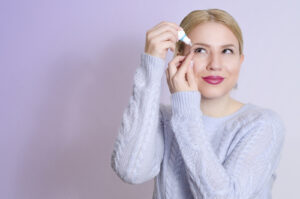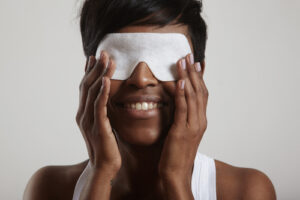When it comes to winter, it’s inevitable that things will feel a little more dry than normal. Your hands may crack and your skin may feel rougher.
But for people with dry eye syndrome, having dry eyes during the winter can feel plain miserable! If your dry eyes are throwing you for a loop as the weather gets colder, keep reading for 7 tips to try this winter!
1. Invest in a humidifier for both your home and office

If it feels like that dry winter air is following you around wherever you go, it may be time to invest in a humidifier (or two). Humidifiers are great any time of the year but they are especially helpful in the winter because they’ll put moisture back into the air.
In the winter, colder temperatures make it necessary to put on the heat in your home or wherever you may be. But the means of heating your home or office may be part of what’s drying out your eyes and skin in the winter.
To combat the drier air that ambient heating sources produce, humidifiers put much-needed humidity back into the air. Make sure you have one wherever you spend the most time.
If you know that you spend a lot of time at the office working, having a humidifier next to you can make a world of difference! You can even find small ones that will plug into your computer using a USB connection. This is the minimum of what you should be doing to keep your eyes feeling more lubricated during the drier winter months.
2. Keep eye drops and artificial tears on hand

You may feel like a pack rat having eye drops and artificial tears in every bag you carry around, but they make a difference. When your eyes are dry, it’s important to get ahead of any symptoms you’re experiencing.
That means if your eyes feel irritated, itchy, or scratchy, you shouldn’t wait to use eye drops or artificial tears until your eyes get to that point. For the best results, you should use eye drops and artificial tears before your eyes even feel dry.
This allows them to stay moisturized and lubricated and lets you fight off any feelings of discomfort. Once your eyes already feel uncomfortable, you become much more likely to rub them and cause further damage.
So be smart and keep artificial tears and eye drops in your desk at work, as well as in your everyday bags that you use the most.
3. Drink more water even if you don’t feel thirsty

No matter what season it may be, you should always aim to drink at least 8 eight-ounce glasses of water every day. But this is obviously easier said than done!
What can you do to make this easier to accomplish? Number one, realize that developing any new habit takes time. In fact, it’s a proven fact that it takes about thirty days (one month) to develop a new habit.
So if you’re finding it difficult to drink enough water and you’ve only been trying to accomplish this new goal for a week or two, it probably hasn’t been long enough. You’ll need more time to let the new goal sink in and become something that you’re used to doing.
If you’re really struggling, you can try a few things like:
- Buying a water bottle that’s fun or pretty to encourage you to use it
- Download an app that’s specifically designed to help you drink more water
- Setting alarms on your phone or smartwatch every thirty minutes to remind you to get up, take a break, and drink more water
These small tasks may be all you need to finally start drinking enough water. Remember that if you start to feel thirsty, this is your body’s way of telling you that you’re already dehydrated.
4. Protect your eyes from the elements when you go outside

It may seem like the most dangerous thing for your eyes when you go outside are UV rays from the sun, but your sunglasses are protecting your eyes from more than just that. In the winter, blowing winds, dust, and debris could cause your already dry eye to become more irritated.
If you don’t make it a point to wear sunglasses that wrap around your eyes whenever you go outside in the winter, you really should. The last thing you want is to have the dust and debris from the wind getting in your eyes, right?
Wearing sunglasses whenever you’re outside is a smart thing to do whether your eyes are dry or not. It protects your eyes from the sun’s dangerous UVA and UVB rays, and keeps your eyes out of harm’s way from dust and debris at the same time.
5. Don’t sit too close to heating sources

Ever sat by a roaring fire and noticed your eyes felt drier? It’s not your imagination! For those with dry eye syndrome, it’s a good idea to not sit too close to any heating sources like radiators, heat pumps, or ambient heating of any kind.
It may feel warm at the time, but there’s a good chance you’ll end up drying out your eyes and feeling worse in the long run. You should also use caution around any kind of blowing air like you’d find while blow drying your hair, or letting heat blow directly on you in a car.
You can certainly still use the heat but do your best not to point these things right at you. This will save your eyes from feeling as dry during ordinary winter activities.
6. Use warm compresses if your eyes feel dry or irritated

If your eyes feel too dry or irritated, you can find relief by using warm compresses. This doesn’t have to be anything complicated!
It can be as simple as a warm washcloth that you soak in warm water and then apply to your eyes for about 10 minutes. Leave the washcloth on your eyes and relax. This should help with any feelings of irritation, at least in the short term.
7. Talk to your eye doctor if your dry eye symptoms get worse

If you feel like you’re avoiding things that should be making your dry eyes worse, but your eyes feel like they aren’t getting any better, talk to your eye doctor. For many people, small lifestyle changes like the ones outlined above aren’t always enough to find relief from their dry eye symptoms.
You may need to try medication or a combination of medication and lifestyle changes before your symptoms get better.
Can’t handle how dry your eyes already are this winter? Schedule an appointment at See Clearly Vision in Arlington or Tyson’s Corner now! There’s no reason to continue suffering when relief could be yours!



















